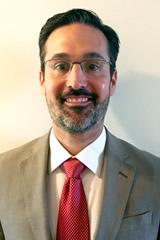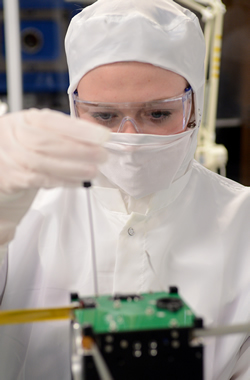Q&A with CPE Chair Lucas Mentzer, Part 2
October 07, 2021

Lucas Mentzer, of Lexington, serves as chair of the Kentucky Council on Postsecondary Education. He has nearly 20 years of experience in information technology at the state, national and global level and holds a bachelor’s degree in computer science from Centre College.
This Q&A is the second of two parts. View part one here.
A priority for the Council and President Thompson is connecting college coursework to the workplace. As a business manager, what’s your take on what we’re doing well to prepare Kentucky’s graduates for careers, and what needs improvement?
We are doing so much good work across the state; I wish I had time to cover all of it here. One of the biggest things we are doing well is increasing the percent and number of students graduating from a higher education program. And we are closing the gap in graduation rates for underrepresented minority students faster than any other state in the nation. This is a huge momentum shift that prepares more students for careers, and it is something we will continue to improve.
Another effective strategy we are implementing well is working with industry representatives from around the state to create and reshape higher education programs to ensure students are obtaining the right skills to match business needs. Our higher education institutions are a key pipeline of talent for Kentucky businesses and close communication with them is vital. Our higher education system should lead directly to the kinds of jobs Kentucky employers need filled.
That said, one area we can improve upon is enhancing internship and apprenticeship programs. The data is clear on the benefit that an internship or apprenticeship can have during a student's education. And the value for the businesses that support these programs is substantial. I would like to see more students, ideally all students, participate in at least one internship or apprenticeship before graduating. That real-world, hands-on experience is formative and vital to training the workforce Kentucky needs to develop and maintain a strong economy.
I want to encourage all students, both young and adult, to pursue their post secondary education. It truly is a gateway to a better life!

Speaking of the workforce, you were involved in Lexmark's mentoring program for STEM students. While Kentucky has been making progress in increasing student interest in this field, how can we further increase enrollment in these programs?
It is true that enrollment in these fields has been increasing, and it did not happen by accident. I want to commend all the folks at the universities, colleges, CPE and the Kentucky Department of Education for making it happen. It took the focused effort of a lot of people, and it is something Kentucky should be proud of for sure. That said, we still need more students in STEM careers to stay competitive in the global economy.
I think one of the ways to do that is to show students that these careers pay. They really pay! I tell students if they want to make life-changing money and have far greater stability in their careers, check out a career in STEM. These jobs have shown themselves to be virtually recession proof. Throughout the COVID 19 lockdowns and economic turmoil, those in STEM careers were far less likely to lose their job. In fact, an analysis by the Bureau of Labor Statistics on employment projections in the pandemic environment predicts strong growth for many STEM occupations in the United States.
The data is all there, but we need to do a better job breaking it down so that students can see their path. This is true at the high school as well as the collegiate level. And the information cannot be abstract; it has to be at the individual level. Something they can relate to from people they can relate to who have similar backgrounds and experiences. This is especially true for our low-income, underrepresented minority and female students, who are less likely to pursue a career in STEM.
One thing I want to call out here is the performance funding model we have in place for universities and colleges. One of the things it does is help incentivize higher education institutions to graduate more students in STEM fields. This is important because to get more students into STEM careers there has to be a holistic approach where all organizations participate. With the performance funding model everyone has skin in the game.
What is your outlook on the near-term future of higher education in Kentucky?
CPE has never been as effective and as efficient as it is right now. Not only is the state getting a high ROI from their investment in higher education, but our collaboration with universities and colleges and the private sector is stronger now than it’s ever been. Kentucky is closing gaps in key educational areas, strengthening our commitment to higher education and positioning the state for a strong economic future. Now is a very exciting time, and I’m proud to be a small part of the progress we are making. With all that we’ve gone through over the last few years, I want to encourage all Kentuckians, regardless of age or life stage, to pursue their postsecondary education. It truly is a gateway to a better life!
You can view Part 1 of this interview here.
Last Updated: 10/12/2021
